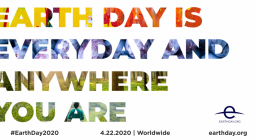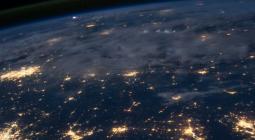Earth Day 2021: When is it and how are people marking global day of environmental action?

As the climate emergency deepens, each successive Earth Day takes on a greater urgency in the fight against the global crisis.
Celebrated every year on April 22, the international day of environmental action draws in an estimated one billion people - making it the largest secular observance in the world.
Amid the pandemic many of this year’s events will take place online following an entirely virtual programme in 2020. Notably, US president Joe Biden has chosen to begin his virtual world leaders summit to address the climate crisis on Earth Day next week.
Are you keen to get involved this Earth Day? Here’s everything you need to know.
-
When is Earth Day?
Earth Day has been marked on 22 April every year since it began in 1970.
This year’s event will span three days from 20-22 April, with a series of both online and in-person activities around the world which can be viewed on this map.
The main Earth Day digital event will take place on 22 April, coinciding with the Biden administration’s climate summit which will also be live-streamed.
Prominent figures taking part in Earth Day include Pope Francis, Al Gore and co-architect of the 2015 Paris Agreement Christiana Figueres.
-
What is Earth Day about?
Earth Day is an annual event designed to drive action on the environment and climate crisis around the world.
This year’s theme is “Restore Our Earth”, with participants urged to focus not only on how we can reduce our impact on the planet - but also on how we might actively repair the world’s ecosystems.
It comes as levels of planet-heating greenhouse gas emissions in the atmosphere continue to rise despite country-wide lockdowns put in place during the pandemic, and plans for a green recovery.
-
What has Earth Day achieved?
The initial idea for Earth Day came to US Senator Gaylord Nelson after witnessing the impact of a massive oil spill in Santa Barbara, California in 1969.
Inspired by the student anti-war movement, Senator Nelson wanted to channel that energy into action to protect the environment. Organisers picked a date that wouldn’t clash with spring break or exams to ensure as many students as possible would be able to turn up.
The first Earth Day in 1970 event saw an astonishing 20 million people across the US taking to the streets — around 10 per cent of the country’s population at the time.
These inaugural demonstrations united Americans across the political spectrum, and within a year the action had led to the formation of the Environmental Protection Agency by Republican president Richard Nixon. It also sparked a wave of legislation in the following years including the Clean Water and Air Acts, and the Endangered Species Act.
Earth Day became an international campaign in 1990, with that year’s event credited with giving a significant boost to recycling efforts worldwide. It also paved the way for the 1992 UN Earth Summit.
Another milestone, Earth Day 2000, chose to address the growing issue of global warming and the switch to clean energy sources.
For the 40th anniversary of Earth Day in 2010, a campaign was launched to plant one billion trees, a target that was achieved in 2012.
In 2016, leaders from 175 countries signed the historic Paris Agreement on Earth Day. The international pact aims to limit global warming to “well below” 2C above pre-industrial levels, and to strive to keep temperatures at 1.5C by the end of the century.
-
What will Earth Day 2021 look like?
As the coronavirus pandemic rages on, this year’s Earth Day will look a bit different from events in previous years.
Organisers last year were forced to cancel in-person gatherings in response to the pandemic, and instead pivoted to 72-hours of digital action.
A second Earth Day Live is going ahead this year with 10-hours of online programming planned starting at 9am EST on the 22 April.
Speakers will discuss natural processes and emerging green technologies that can restore the world’s ecosystems. The full programme can be viewed here.
There are thousands of local events taking place too, both online and in person, which can be viewed on this map.
Organisers have also shared a toolkit to help you get involved, from organising a teach-in to educate people on the climate crisis to hosting a clean-up to pick up litter in your local park, beach or streets.
15 April 2021
INDEPENDENT




